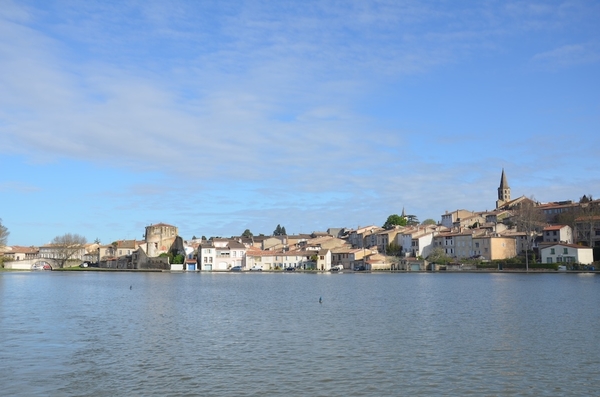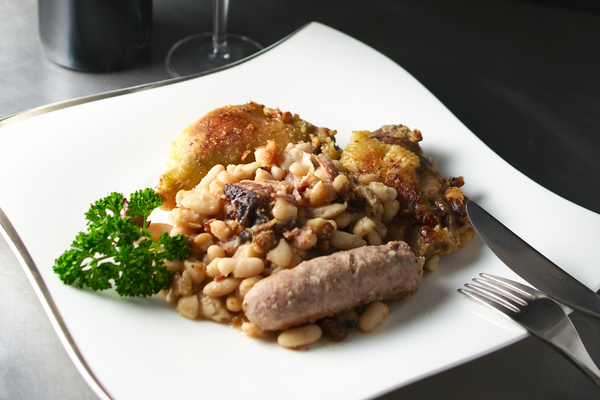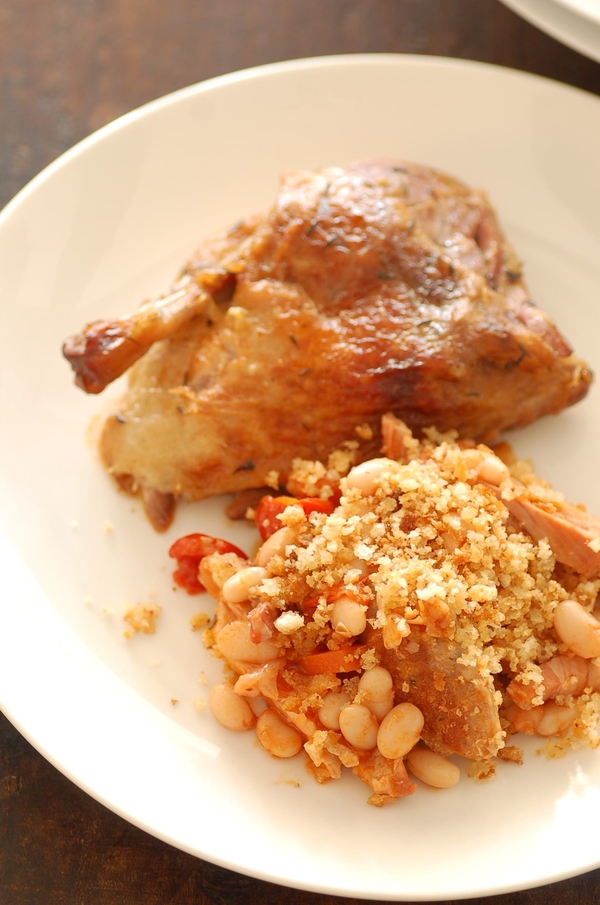This post is part of our Behind the Bite series: deep dives into the dishes that we can’t stop thinking about.
Battles have been won—literally—on the shoulders of cassoulet, a hearty ragout from southwestern France.
And to be honest, we can understand why. Nothing hits the spot quite like a hearty serving of cassoulet, especially in the winter—it’s the ultimate comfort food.
So what’s the story behind this French favorite, anyway?

Photo Credit: Eric Hossinger, Text Overlay: Devour Paris Food Tours
The humble history of cassoulet
As legend has it, the dish dates back to the Hundred Years’ War (which in reality lasted more than 100 years—from 1337 to 1453) between the French and the English.
During the siege of the city of Castelnaudary, peasants, facing starvation, were said to have thrown whatever they could find—beans, duck, sausage and other odds and ends—into a pot called a cassole to create a stew. They then put the big pot into the oven, and ate the heaping dish that emerged.
Their communal mindset paid off.
“After eating the cassoulet, they had enough energy to chase off the English,” Bethany Estève, a conference guide at the Castelnaudary Office of Tourism, says of the legend.

Although it was developed in the region of Occitan, cassoulet is actually an adaptation of a Middle Eastern ragout, Estève says.
It wasn’t until the 16th century that the fava beans in the original recipe were replaced by white beans, which were believed to contribute to women’s fertility. In fact, it was French noblewoman Catherine de Medici, mother of more than ten children, who was said to have popularized the dish during her time as the Countess of Lauragais.
Originally considered a peasants’ dish, and not a part of high class French cuisine, cassoulet made its way to upscale Paris bistros in the 19th century. Restaurant des Frères Provençaux, founded by three brothers from Marseille, introduced Parisians to a number of southern French dishes, including cassoulet and the Marseille specialty bouillabaisse.
Castelnaudary, in particular, was recognized for its cassoulet in the early-20th-century French restaurant guide “Le Tour Gastronomique de France,” a precursor to the Michelin Guide of today.
The official cassoulet recipe (and regional variations)
Castelnaudary is widely regarded as France’s capital of cassoulet, and it’s the only place in the world that can claim to hold the official recipe. Set on a bed of white beans, cassoulet is a ragout composed of regional sausage, several pork-based pieces (including pig’s foot, skin, and shoulder), duck leg and an assortment of vegetables and garnishes.
All of the ingredients can be found in southwestern France, though different cities in the region, such as Castelnaudary, Carcassonne and Toulouse, have all adapted their own particular version of it. In Toulouse, they add tomatoes and bake bread crumbs on top. In Carcassonne, cassoulet is prepared after the hunt, so the dish is filled with game animals, as opposed to those found on a farm.

A changing classic: cassoulet in modern France
Today, the dish remains a major draw for the otherwise sleepy town of Castelnaudary.
Located almost equidistantly between Toulouse and the Mediterranean coast, Castelnaudary’s economy relies heavily on the dish. More than 10 local cassoulet factories ship canned cassoulet across France, and dozens of local restaurants serving the dish cater to visitors. The Local reports that 90 percent of the highest quality cassoulet is produced in Castelnaudary.
“When people come into the tourism office, we ask them, ‘Why did you come to Castelnaudary?’ The answer’s always: ‘We came to eat cassoulet,’” Estève says.
That said, Castelnaudary is no longer the only place to test out the hearty stew. In Paris, modern chefs, such as those at L’Assiette, experiment with unique ingredients like lamb neck and garlic sausage. The dish can even be found as far away as New York City.

Despite the globalization of cassoulet, its history and culture remain unique—and treasured—in southern France.
2019 marked the 20th anniversary of the Fete du Cassoulet, a party thrown in the name of the regional delicacy. More than 60,000 eager visitors descend upon the town to check out the late summer event.
And in May of the same year, the so-called Academie du Cassoulet, a school dedicated to the dish, hosted its 21st “Assembly General” to discuss culinary developments related to cassoulet.
For those who can’t get enough of the main dish, there’s one more cherry on top: cassoulet ice cream.
“It’s a bit heavy,” Estève adds. “But it’s very good.”
Although it’s not traditional, I use ground chorizo and shrimp along with the tomatoes and white beans. We eat it almost weekly!
That sounds fantastic—what a great adaptation!